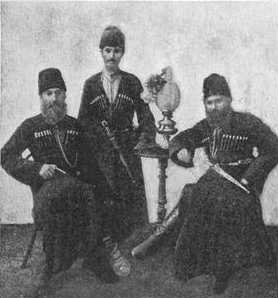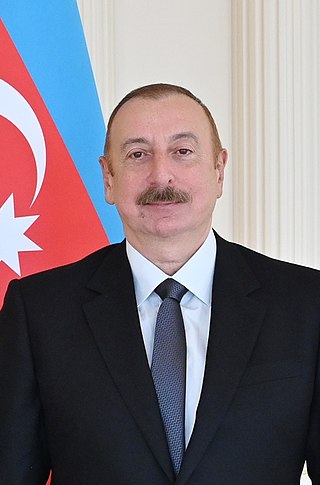
Azerbaijan, officially the Republic of Azerbaijan, is a transcontinental country located at the boundary of Eastern Europe and West Asia. It is a part of the South Caucasus region and is bounded by the Caspian Sea to the east, Russia to the north, Georgia to the northwest, Armenia and Turkey to the west, and Iran to the south. Baku is the capital and largest city.

Baku is the capital and largest city of Azerbaijan, as well as the largest city on the Caspian Sea and in the Caucasus region. Baku is 28 metres (92 ft) below sea level, which makes it the lowest lying national capital in the world and also the largest city in the world below sea level. Baku lies on the southern shore of the Absheron Peninsula, on the Bay of Baku. Baku's urban population was estimated at two million people as of 2009. Baku is the primate city of Azerbaijan—it is the sole metropolis in the country, and about 25% of all inhabitants of the country live in Baku's metropolitan area.

Nagorno-Karabakh is a region located in the South Caucasus, covering the southeastern stretch of the Lesser Caucasus mountain range. Part of the greater region of Karabakh, it spans the area between Lower Karabakh and Syunik. Its terrain mostly consists of mountains and forestland.

Azerbaijani or Azeri, also referred to as Azeri Turkic or Azeri Turkish, is a Turkic language from the Oghuz sub-branch spoken primarily by the Azerbaijani people, who live mainly in the Republic of Azerbaijan where the North Azerbaijani variety is spoken, and in the Azerbaijan region of Iran, where the South Azerbaijani variety is spoken. Although there is a very high degree of mutual intelligibility between both forms of Azerbaijani, there are significant differences in phonology, lexicon, morphology, syntax, and sources of loanwords.

Azerbaijanis, Azeris, or Azerbaijani Turks are a Turkic ethnic group living mainly in the Azerbaijan region of northwestern Iran and the Republic of Azerbaijan. They are predominantly Shia Muslims. They comprise the largest ethnic group in the Republic of Azerbaijan and the second-largest ethnic group in neighboring Iran and Georgia. They speak the Azerbaijani language, belonging to the Oghuz branch of the Turkic languages.

Artsakh, officially the Republic of Artsakh or the Republic of Nagorno-Karabakh, is a breakaway state in the South Caucasus whose territory is internationally recognised as part of Azerbaijan. Between 1991 and 2023, Artsakh controlled parts of the former Nagorno-Karabakh Autonomous Oblast, including the capital of Stepanakert, prior to the 2023 Azerbaijani offensive. It has been an enclave within Azerbaijan. Its only overland access route to Armenia is via the 5 km (3.1 mi) wide Lachin corridor.

The Nagorno-Karabakh conflict is an ethnic and territorial conflict between Armenia and Azerbaijan over the disputed region of Nagorno-Karabakh, inhabited mostly by ethnic Armenians until 2023, and seven surrounding districts, inhabited mostly by Azerbaijanis until their expulsion during the 1990s. The Nagorno-Karabakh region has been entirely claimed by and partially controlled by the breakaway Republic of Artsakh, but is recognized internationally as part of Azerbaijan. Azerbaijan gradually re-established control over Nagorno-Karabakh region and the seven surrounding districts since 2020.

The history of the Jews in Azerbaijan dates back many centuries. Today, Jews in Azerbaijan mainly consist of three distinct groups: Mountain Jews, the most sizable and most ancient group; Ashkenazi Jews, who settled in the area during the late 19th-early 20th centuries, and during World War II; and Georgian Jews who settled mainly in Baku during the early part of the 20th century.
Azerbaijan is a multicultural and multi-religious country and a secular country. The article 48 of The Constitution of Azerbaijan states that the right to liberty and the right of people of all faiths may choose and practice their religion without restriction is ensured. Article 18 of the Constitution of Azerbaijan states that religion acts separately from the state affairs and the government. People of all religions are considered equal in the Azerbaijani law. While majority of the population is Muslim, the proselytization of Islam in the country, as well as other religions, is prohibited strictly by the government through policies of state secularism.
Privolny (masculine), Privolnaya (feminine), or Privolnoye (neuter) may refer to:

Ilham Heydar oghlu Aliyev is an Azerbaijani politician serving as the fourth president of Azerbaijan since 31 October 2003. He is a former prime minister of Azerbaijan. The son and second child of former Azerbaijani leader Heydar Aliyev, Aliyev became the president of Azerbaijan in 2003 through a presidential election defined by irregularities following his father's death. He was reelected for a second term in 2008 and was allowed to run in elections indefinitely in 2013 and 2018 due to the 2009 constitutional referendum, which removed term limits for presidents. Throughout his electoral campaign, Aliyev served as a member of the ruling New Azerbaijan Party, which he has headed since 2005.

Russians are the second largest ethnic minority in Azerbaijan and is also the largest Russian community in the South Caucasus and one of the largest outside of Russia. Although in decline, the community still numbers 119,300 people as of 2009. Since their arrival at the beginning of the 19th century, the Russians have played an important role in all spheres of life, particularly during the Czarist and Soviet period, especially in the capital city of Baku.

Privolnoye is a rural locality in Krasnogvardeysky District of Stavropol Krai, Russia, located on the Yegorlyk River. Population: 3,350 (2010 Census); 3,491 (2002 Census).
Privolny, Privolnaya, or Privolnoye is the name of several rural localities in Russia.

Khuchap Monastery or Khujabi Monastery is a monastery dedicated to Our Lady of Iviron. It is situated in Privolnoye, a village in the Lori Province of Armenia, near the border with Georgia.
Dubovoye is a rural locality and the administrative center of Dubovsky Selsoviet of Mikhaylovsky District, Amur Oblast, Russia. The population was 302 as of 2018. There are 12 streets.
Privolnoye is a rural locality in Dubovsky Selsoviet of Mikhaylovsky District, Amur Oblast, Russia. The population was 50 as of 2018. There are 2 streets.

The Armenia–Georgia border is the international boundary between Armenia and Georgia. It is 219 km (136 mi) in length and runs from the tripoint with Turkey in the west to the tripoint with Azerbaijan in the east.

The Second Nagorno-Karabakh War was an armed conflict in 2020 that took place in the disputed region of Nagorno-Karabakh and the surrounding territories. It was a major escalation of an unresolved conflict over the region, involving Azerbaijan, Armenia and the self-declared Armenian breakaway state of Artsakh. The war lasted for 44 days and resulted in Azerbaijani victory, with the defeat igniting anti-government protests in Armenia. Post-war skirmishes continued in the region, including substantial clashes in 2022.















